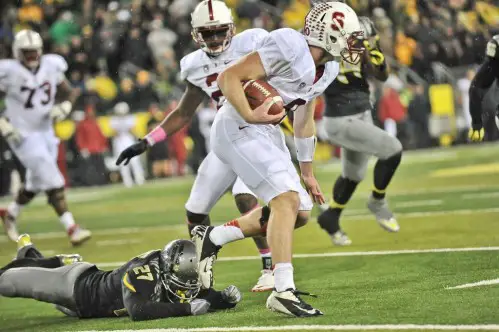We all know how Ted Miller and the ESPN Pac-12 Blog hate the overuse of the transitive property. You can read about it here (among lots of other places). Could Ted Miller and all the posters on the football blogs be WRONG about this? For as long as all of us have been on the web, it has been assumed as fact that the transitive property just doesn’t hold much water. But is there evidence that actually SUPPORTS the transitive property?
For those who aren’t familiar with the transitive property, it’s simply this: if team A beats team B and team B beats team C, then team A must be better than team C. Then if team C beats team D…
It’s logical, but as Ted points out, logic doesn’t always apply and the transitive property CAN be taken to extremes. As revealed here, one ESPN reporter goes so far as to pretend that the transitive property proves that the Washington Huskies are actually the true national champions. To find out what it REALLY proves about the Washington Huskies, read on!
But first – an acknowledgement of the limitations of the transitive property: No team plays at the same level every game. Some teams get stronger as the year goes on; some get weaker. Some teams have key players get injured and some teams have injured players return. Some teams match up better against certain teams. Sometimes the ball just plain bounces one team’s way. Some teams play great at home and stink on the road. And some teams – as proven by the transitive property – are just downright bipolar.
So the transitive property admittedly can look ridiculous when somebody picks and chooses his upsets to “prove” that a team like, say the Huskies, is better than say, Alabama. It’s sort of like “picking” the winning lottery numbers the day after the numbers are announced.
Still, in making a guess about how two teams will do against each other before they actually play, how they made out against common foes is as good of a place to start as any. From there you can factor in injuries, home field advantage, match-ups and, especially in the case of the “Would-be National Champion” Huskies, probably moon phases as well.
But when all is said and done, how accurate is the transitive property? Does it deserve all the bad press it gets? At fishduck.com we pride ourselves on analysis, so we analyzed the 2012 Pac-12 campaign for all the teams and found the transitive property to be 89% accurate. And if it hadn’t been for the Huskies getting confused and going from being arctic dogs to polar dogs to downright BI-POLAR dogs, it would have been 96 + % accurate, because the Bi-Polar Dogs really screwed up the equations by beating Stanford and Oregon State and losing to Arizona and (gasp!) Washington State.
How anyone could possibly beat Stanford and lose to Wazoo can only be explained by “time of the month.” Note that the Huskies upset Stanford on September 27 and Oregon State on October 27. And the games they should have won – but managed to lose – were to Arizona on October 20 and Washington State on November 23. So they seemed to be “down on their cycle” (to put it nicely) around the 20th of each month, but then by the 27th they were all over it and able to leap tall buildings with a single bound. Unfortunately, their bowl game against Boise State was on December 22nd instead of the 27th.
But I digress. Back to the percentages and how we came up with them. If only six out of the conference’s fifty-four games during 2012 had gone the other way, the transitive property would have been a perfect predictor; that is, every team would have beaten only teams that finished below it and lost only to teams that finished above.
The final standings would have been:
| Stanford | 9 | – | 0 | |||
| Oregon | 8 | – | 1 | |||
| Oregon State | 7 | – | 2 | |||
| UCLA | 7 | – | 2 | |||
| USC | 6 | – | 3 | |||
| Bipolar Dogs | 5 | – | 4 | |||
| Arizona State | 5 | – | 4 | |||
| Arizona (*) | 2 | – | 7 | |||
| Utah (*) | 3 | – | 6 | |||
| California | 1 | – | 8 | |||
| Colorado | 1 | – | 8 | |||
| Wazoo | 0 | – | 9 | |||
| (*) – Note that Arizona did not play California and Wazoo, while | ||||||
| Utah had its way with all three listed below it and missed out on | ||||||
| playing Oregon and Stanford. So, based on strength of schedule | ||||||
| and head-to-head competition, our seven independent and | ||||||
| objective computers ALL placed Arizona ahead of Utah despite | ||||||
| the records. And – Notre Dame, Florida and Kansas State aside, | ||||||
| we all know computers can’t be wrong. | ||||||
As hinted at above, the Huskies mucked things up the most by beating Stanford and Oregon State and losing to Arizona and Wazoo. The only other two games that broke form were Arizona edging USC and California somehow managing to beat UCLA (and fairly badly at that, but then when UCLA played Baylor, it was pretty obvious who the “bi-Polar bears Bruins” were). Of course, it would have been an improvement if Oregon had beaten Stanford, but the goal here is to prove how close the transitive property came to perfection, not how close the world came to perfection.
So, Washington aside, 52 out of the 54 games (96 + %) would have gone to form, and even WITH the Huskies’ “monthly” issues thrown in, 48 out of the 54 (89 %) went to form! So the next time somebody poo-poos the transitive property, you now have some stats that you can throw at them. 89 %, Ted!! And remember, you heard it first at FishDuck.com. As for the Washington Huskies: they do have pills for that, you know.
Related Articles:
Chip Kelly Update: Everything's Good Again ...
Chip Kelly Update: Wailing and Gnashing of Teeth
Shock and Awe -- The Oregon Ducks' Football Hangover Effect
Despite Lopsided Score, Georgia State "Never Stopped Believing"
Hope Springs Eternal for Ducks
Incompetent Pac-12 Officials: How Do You Miss ALL of THIS?
Mike (Editor-in-Chief) is a 1970 graduate of the University of Oregon where he attended the Honors College and received all-conference honors as a swimmer. After college, Mike ran for the Oregon Track Club and narrowly missed qualifying for the US Olympic Trials in the marathon. He continues his involvement in sports with near-daily swimming or running workouts, occasional masters swim competition (where he has received two Top-10 World rankings), providing volunteer coaching to local triathletes and helping out with FishDuck.com.
Mike lives on 28 acres in the forest near Sandpoint, Idaho, where he has served as a certified public accountant for most of his working career. His current night job is writing novels about Abby Westminster, the only known illegitimate daughter of Britain’s finest secret agent who has to bring down arch-villains plotting dastardly deeds. And, yes, Abby is also a DUCK!



